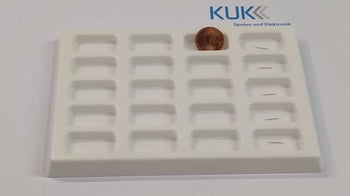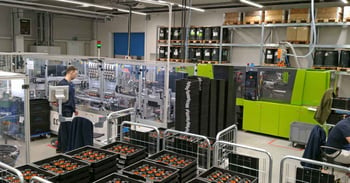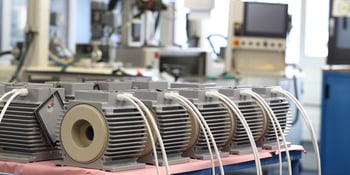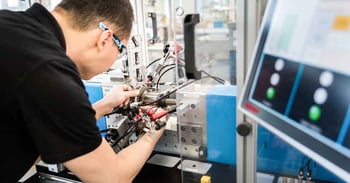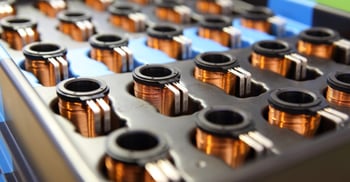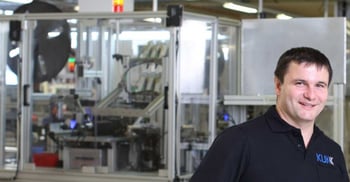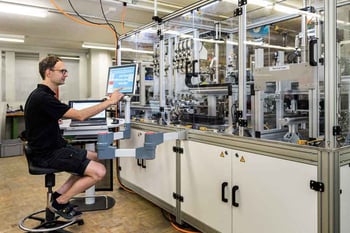Supply chain options for defence coil winding
In the face of evolving global strategic demands, the defence sector is experiencing a shortage in coil winding capacity. Learn how partnering with established contract manufacturers can bridge this gap and ensure mission-critical reliability. Opting for partners with established Western supply chains and production sites provides defence contractors with confidence in the reliability, performance, and the trustworthy origin and compliance of their critical coil components.
As the global strategic landscape evolves, the defence sector faces increasing pressures to enhance its technological capabilities. This has led to a surge in demand for high-performance components, including specialized coils for military and defence applications. These coils are integral to the functioning of critical systems such as missile guidance, avionics, and satellite communications.
The urgency to upgrade and expand defence capabilities has resulted in a bottleneck in coil winding capacity. This shortage is compounded by the complexities of manufacturing coils that meet stringent military specifications. As defence budgets expand and new projects are initiated, the need for reliable, high-quality coil production has never been more critical.
Challenges in meeting military coil requirements
Manufacturing coils for the defence sector involves unique challenges that are not typically encountered in civilian applications. These coils must endure extreme conditions, including high temperatures, intense vibrations, and exposure to harsh environmental elements such as moisture, dust, and corrosive substances.
The coils are often required to function in environments where they are subjected to rapid temperature fluctuations, high levels of mechanical stress, and electromagnetic interference.
 This necessitates the use of specialized materials and advanced engineering techniques to ensure that the coils maintain their integrity and performance under such demanding conditions. Additionally, the coils must be designed to operate reliably over extended periods without failure, as any malfunction could compromise critical defence systems. This level of durability and resilience is essential to meet the rigorous standards set by military specifications, which demand not only exceptional performance but also long-term reliability in the most challenging operational scenarios.
This necessitates the use of specialized materials and advanced engineering techniques to ensure that the coils maintain their integrity and performance under such demanding conditions. Additionally, the coils must be designed to operate reliably over extended periods without failure, as any malfunction could compromise critical defence systems. This level of durability and resilience is essential to meet the rigorous standards set by military specifications, which demand not only exceptional performance but also long-term reliability in the most challenging operational scenarios.
In addition to environmental resilience, defence coils must offer precision performance, space and weight efficiency, and mission-critical reliability. The complexity of these requirements makes it difficult for traditional manufacturers to meet the necessary standards consistently. This has led to delays and increased costs, further exacerbating the shortage in coil winding capacity.
Advantages of partnering with contract manufacturers
To address the shortage in coil winding capacity, the defence sector can benefit significantly from partnering with established contract manufacturers. These manufacturers bring a wealth of experience and specialized knowledge in producing high-performance coils tailored to meet military specifications. By leveraging their expertise, defence contractors can ensure the timely delivery of reliable components.
 Contract manufacturers with a strong track record in the industry offer several advantages. They provide scalable production capabilities, allowing for rapid adjustments to meet changing demands. These include custom coil winding, encapsulation and covering, and advanced assembly processes. Techniques such as automated winding for transformer and toroid cores, and vacuum impregnating of wound-copper coils, are part of their extensive portfolio. Additionally, their adherence to strict quality control measures ensures that each coil produced meets the highest standards of precision and durability.
Contract manufacturers with a strong track record in the industry offer several advantages. They provide scalable production capabilities, allowing for rapid adjustments to meet changing demands. These include custom coil winding, encapsulation and covering, and advanced assembly processes. Techniques such as automated winding for transformer and toroid cores, and vacuum impregnating of wound-copper coils, are part of their extensive portfolio. Additionally, their adherence to strict quality control measures ensures that each coil produced meets the highest standards of precision and durability.
Ensuring origin and compliance in defence coil manufacturing
In the context of safeguarding proprietary technologies and maintaining robust alliances, Original Equipment Manufacturers (OEMs) in the military sector exercise heightened caution in their supply chain decisions. This strategic approach underscores the preference for manufacturing within Western countries, a decision driven by the imperative to mitigate political risks. By localizing production, OEMs can better control the security of sensitive technologies and ensure compliance with stringent regulatory frameworks, such as ITAR (International Traffic in Arms Regulations). This not only fortifies the integrity of defence systems but also aligns with broader geopolitical strategies, reinforcing the stability and reliability of Western alliances.






